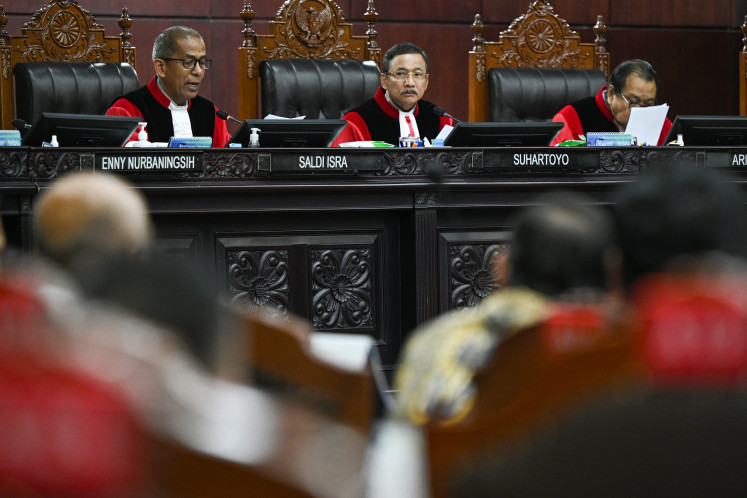Popular Reads
Top Results
Can't find what you're looking for?
View all search resultsPopular Reads
Top Results
Can't find what you're looking for?
View all search resultsAnalysis: Indonesia’s retail industry and changes in consumer behavior
As one of the world’s emerging markets and high-growth nations, Indonesia is expected to have a rising economy
Change text size
Gift Premium Articles
to Anyone
As one of the world’s emerging markets and high-growth nations, Indonesia is expected to have a rising economy. One of the indicators can be seen in high demand for consumer goods, reflected in the performance of several industries, including the retail business.
However, the growth of Indonesia’s retail industry currently seems to be lukewarm and no longer as enticing as before. This is happening not only in Indonesia as global retailers have also been facing declining
trends because of changes in consumer behavior. So what are the factors that have been driving the changes?
From a macroeconomics perspective, the weak start to this year’s consumption rate is attributed to lower real income growth, delayed distribution of annual rice subsidies, decelerating fiscal spending and the anticipated 130-percent increase in electricity rates for the middle-income population.
Looking back further, the level of the consumer price index (CPI) during the fasting month of Ramadhan and the subsequent Idul Fitri holiday had not jumped significantly over the past four years, albeit consumer spending during the festivities should be greater compared to that in other months.
The end of the commodity boom is one of main reasons behind the weakening people’s purchasing power. Customers are to be more selective in allocating funds for consumption. Although there were signs of a global economic recovery, including the commodity price rally, around nine months ago, they have yet to make a significant impact on consumption.
As people’s education level and financial literacy rates have started to increase, there will be changes in their private consumption behavior.
It is possible to see a shift in consumer behavior patterns, with people opting to accumulate wealth before spending as income growth sustains.
Awareness on the importance of personal savings and investments are also expected to increase with the introduction of the government’s social security programs that rely on cashless operations. For people in the lower-income bracket, the intention to purchase durable and economical goods, meanwhile, has also started to increase.
Another indicator on higher economic growth is also seen in the recovery in the growth of loan disbursement and third-party funds.
The growth of third-party funds has rebounded sharply from mid-2016. This also indicates that rather than spending heavily on consumption, people are allocating income from higher commodity prices to enlarge working capital.
Learning from previous mistakes, relying solely on commodities without venturing into product development or business diversification would lead to slower business growth when the price boom is over. Thus, there is a higher portion allocated in investment and capital expenditure in the consumption pattern’s new normal.
While consumer behavior has changed in terms of income portion allocation, there are also changes in global spending and shopping patterns. In the United States, big brands such as JC Penney, Payless, Macy’s and Sears have either announced store closures or filed for bankruptcy.
According to US-based asset management group Cohen & Steers, the shifts in the retail industry were caused by an oversupply of retail stores and shopping malls, changes in consumer spending from apparel toward experiences (e.g. travel and music), the expansion of e-commerce and the decline of department store businesses.
The e-commerce sector in Indonesia has also affected the performance of local retailers, as more customers now prefer to shop online instead of getting a product from the shelf.
The growth of e-commerce revenue in Indonesia is expected to hit more than 20 percent per year until 2021. Almost all of Indonesia’s online marketplaces (e.g. Tokopedia, Shopee, JD.ID, Lazada and Zalora), in cooperation with logistics/delivery service providers (e.g. TIKI, JNE, NinjaExpress and GoSend) and the banking sector’s payment systems (e.g. e-cash Mandiri, KlikBCA), make the online shopping experience more seamless.
E-commerce has also become a solution for many Indonesian consumers, who are having difficulties in accessing certain products because of the absence of brick-and-mortar stores in their region. Consumers can also use their time more efficiently with a high variety of product options without the need to visit several stores and make price comparisons in person.
The products will also be delivered directly to their addresses, thus cutting down on transportation costs. In regard to premium products, consumers can check them out at stores before making online purchases.
However, there will always be a need for retailers to have stores or flagship boutiques. People still like to visit showrooms and buy directly at retail outlets, especially high-end brands selling expensive products or jewelry.
The e-commerce growth not only moves online sales, it also builds new shopping habits. Hence, learning from the US experience, retailers need to refrain from expanding or adding stores. Instead of having plans to expand, these retailers should improve its online-based services.
In the future, stores will only be needed to maintain product experience and accommodate emergency or impulsive buying. Indonesian retailers, such as Mitra Adiperkasa, IKEA and Ace Hardware, have begun to introduce online shopping platforms and several other brands seem to be following suit.
The change of behavioral consumption and the so-called disruption in Indonesia’s retail industry is a new normal that is inevitable. It is not necessarily a threat, but it can be seen as an opportunity for the industry, depending on how well we adapt to change.
_______________________________________
The writer is a researcher at Mandiri Institute, an independent research think tank of Bank Mandiri, focusing on public policy, finance and banking sector.










